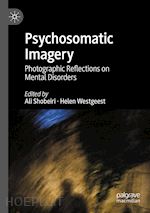
Questo prodotto usufruisce delle SPEDIZIONI GRATIS
selezionando l'opzione Corriere Veloce in fase di ordine.
Pagabile anche con Carta della cultura giovani e del merito, 18App Bonus Cultura e Carta del Docente
This book explores the potential of specific photographic images for reflecting on experiences of mental disorders. Instead of looking at photographs of (people suffering from) mental disorders, this volume aspires to comprehend the complexities of such conditions through photographic lexicons, metaphors, and practices. For this book, a mental disorder is not to be seen as a dysfunction or impairment, but a state in which the sustaining balance of stable and unstable mind is unsettled, which may induce mental/bodily disturbances. The term “psychosomatic” refers to the interaction of the mind (psyche) with the body (soma); it refers to their co-dependence. By the term “Psychosomatic Imagery” this volume refers to a distinctive trope of photographic images that deal with the body-mind interaction during the states of mental disorders. This novel theoretical framework in photography theory instigates critical discussions about the experiences of mentaldisorders visualized as disturbed corporeal and mental perceptions of the world. While the introduction of the volume unpacks and assesses the applications of photography in mental disorder studies from theoretical and historical perspectives, the chapters focus on specific cases of Psychosomatic Imagery in contemporary photography. Those cases include, but are not limited to: PTSD, hysteria, paranoia, psychosis, bipolar disorder, and Hikikomori.
Ali Shobeiri is Assistant Professor of Photography and Visual Culture at Leiden University, The Netherlands. He is the author of Place: Towards a Geophilosophy of Photography (2021) and co-editor of Animation and Memory (2020).
Helen Westgeest is Associate Professor of Modern & Contemporary Art History and Theory of Photography at Leiden University, The Netherlands. She is the author of Slow Painting: Contemplation and Critique in the Digital Age (2020) and Video Art Theory (2016).











Il sito utilizza cookie ed altri strumenti di tracciamento che raccolgono informazioni dal dispositivo dell’utente. Oltre ai cookie tecnici ed analitici aggregati, strettamente necessari per il funzionamento di questo sito web, previo consenso dell’utente possono essere installati cookie di profilazione e marketing e cookie dei social media. Cliccando su “Accetto tutti i cookie” saranno attivate tutte le categorie di cookie. Per accettare solo deterninate categorie di cookie, cliccare invece su “Impostazioni cookie”. Chiudendo il banner o continuando a navigare saranno installati solo cookie tecnici. Per maggiori dettagli, consultare la Cookie Policy.